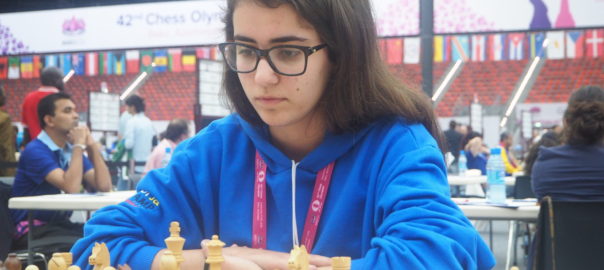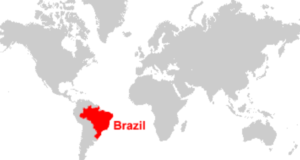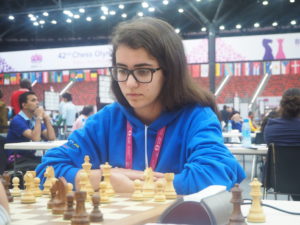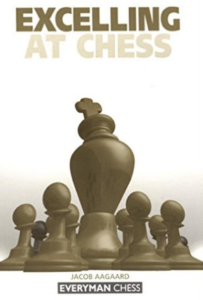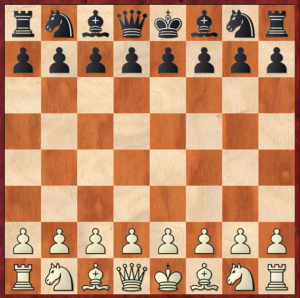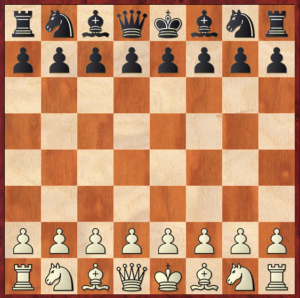18 year old Kathie Lebrelato with a rating of 2079 is Brazil’s youngest player on the Women’s team. She is currently the top female in Brazil U18 and the 7th ranked female U18 in South America. In this Olympiad she has been selected to play board 4, but has played a couple of games on board 2 and 3.

Brazil, the largest country in South America stretches from the Amazon Basin in the north to vineyards and massive Iguaçu Falls in the south. It is the world’s fith largest country. Rio de Janeiro, symbolized by its 38m Christ the Redeemer statue atop Mount Corcovado, is the capital. Unlike some of the other South American countries, the language spoken in Brazil is portugese.
Of course we are all familiar with Brazil, not only for their excellent soccer team, but also for hosting the Olympics and Paralympics this year. Who can forget all our swimmers, cyclists and athletes proudly representing Australia only a couple of weeks ago. Perfect time to ask Kathie about her journey from Brazil.
Chesslife: How old were you when you started playing chess?
Kathie: I started playing chess when I was about 10 years old at school. I started playing seriously with coaching when I was about 13 years of age.
Chesslife: How much chess do you study per week or per day?
Kathie: I study every day, approximately 3-4 hours. I have started studying endgames now as there is so much I don’t know yet.
Chesslife: What is your favourite chess book?
Kathie: I enjoy reading ‘Excelling at Chess’ by Jacob Aargaard [published by Everyman chess in 2002]. I am reading this is in Spanish not English.
Chesslife: Is this your first Olympiad and what was your first International Tournament?
Kathie: Yes this is my first Olympiad. My first international tournament was in 2015 in Colombia, the Sul Americano U20.
Chesslife: Who is your favourite player?
Kathie: I love watching Alexandr Fier, a Brazilian Grandmaster currently playing on board 1, but of course Caruana and Carlsen are also on the top of my list! I love their dynamic playing style.
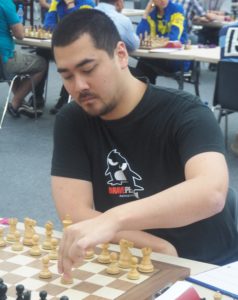
Chesslife: What is the junior chess league llike in Brazil?
Kathie: There are quite a few juniors playing, but not many progress. I think this is because there appears to be no incentive for them to continue playing. My city Icara has many tournaments and is supportive of chess, so I have been very lucky.
Chesslife: What has chess taught you?
Kathie: Chess has taught me many things. It has allowed me to play in many cities around Brazil and the world. I am a very shy person and chess has taught me to talk and interact with different people. Something I would have never done without chess. I am more social now. Lastly I have matured a lot through chess. I am taking responsibilities for decisions in life.
Chesslife: How would you describe your style of play?
Kathie: I am trying to become more dynamic, but I am a very positional and quiet player, which matches my personality. I enjoy playing solid games. At the moment I play very dynamic for Black, but am looking at changing that to a slower Kings Indian variant.
Chesslife: What is your most memorable game?
Kathie: I truly enjoyed the game I played against Wales in the Olympiad in round 6. I was a very positional game, well balanced.
Click on the board below for a review of Kathie’s game against Imogen Camp from Wales in round 6
Chesslife: What are your goals for the future?
Kathie: To continue to improve my chess and play at the next Olympiad for Brazil. This means I will need to play in many tournaments in the next couple of years, for example the Brazil Open. For the slightky longer term, I would like to become a WGM.
Let’s give you a bit of an overview of the difference between GM (Grandmaster) and WGM (Women’s Grandmaster):
The title Grandmaster is awarded to outstanding chess players by FIDE. Grandmaster is the highest title a chess player can attain. Woman Grandmaster (achieved at some time a rating of 2300) is the highest-ranking chess title restricted to women aside from Women’s World Champion. FIDE introduced the WGM title in 1976. The WGM title represents a level of chess skill lower than that of the unrestricted Grandmaster (GM) (2500) title, and WGM requirements are also a little bit lower than the requirements for the unrestricted International Master (IM) (2400) title. The winner of the World Girls Junior Championship is automatically awarded the WGM title. (information obtained from Wikipedia)
Chesslife: What advice would you give to Australian Junior chess players?
Kathie:
Do what you like! If you like chess, play chess!
You should never fear major challenges. You should always seek to play against the best and not fear this as it will evolve your chess and you will become a better player.
Play chess with Joy!
Click on the board below for an analysis of Kathie’s game against Aynur Katanova from Azerbaijan.
